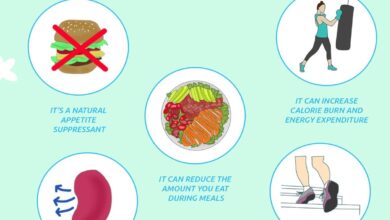
10 Things to Know Before Trying the F-Factor Diet
10 things to know before trying the f factor diet – 10 Things to Know Before Trying the F-Factor Diet: You’ve probably heard about the F-Factor diet, the high-fiber, low-glycemic approach that promises weight loss, better digestion, and even more energy. But before you dive into this unique eating plan, there are a few things you should know.
This diet, created by registered dietitian and nutritionist Tanya Zuckerbrot, is all about embracing the power of fiber and focusing on “factor foods” – those that promote satiety and keep your blood sugar levels stable.
The F-Factor diet emphasizes incorporating a variety of fiber-rich foods, like fruits, vegetables, whole grains, and legumes, into your daily meals. The diet also encourages limiting processed foods, sugary drinks, and refined carbohydrates. While the F-Factor diet has gained popularity for its potential weight loss benefits, it’s essential to understand its nuances and whether it aligns with your individual health goals and lifestyle.
What is the F-Factor Diet?

The F-Factor Diet, created by registered dietitian Tanya Zuckerbrot, is a weight-loss program that emphasizes high-fiber foods and portion control. It focuses on making sustainable lifestyle changes rather than promoting a strict, short-term diet.
The F-Factor Diet’s Principles
The F-Factor Diet is built upon the principle of “factor foods,” which are high-fiber foods that help you feel fuller for longer, aiding in weight loss and improving digestion. The diet encourages incorporating these foods into your meals and snacks to promote a sense of satiety and regulate blood sugar levels.
Fiber Intake
The F-Factor Diet emphasizes the importance of fiber intake. Fiber is a type of carbohydrate that the body cannot digest. It adds bulk to your stool, promoting regular bowel movements and preventing constipation. The diet encourages consuming 35-45 grams of fiber daily, which is significantly higher than the recommended daily intake of 25 grams for women and 38 grams for men.
Factor Foods
Factor foods are the cornerstone of the F-Factor Diet. These foods are high in fiber and have a low glycemic index, meaning they don’t cause rapid spikes in blood sugar levels. Some examples of factor foods include:
- Fruits: Berries, apples, pears, bananas, oranges
- Vegetables: Broccoli, spinach, Brussels sprouts, carrots, asparagus
- Legumes: Beans, lentils, chickpeas
- Whole grains: Oats, quinoa, brown rice
- Nuts and seeds: Almonds, walnuts, chia seeds, flaxseeds
Benefits of the F-Factor Diet
The F-Factor Diet claims to offer several benefits, including:
- Weight loss: By promoting satiety and regulating blood sugar levels, the diet helps reduce calorie intake and promote weight loss.
- Improved digestion: The high-fiber content of factor foods aids in digestion and prevents constipation.
- Increased energy: The diet’s emphasis on whole foods and complex carbohydrates provides sustained energy throughout the day.
- Reduced risk of chronic diseases: The diet’s focus on fiber and healthy foods may reduce the risk of heart disease, type 2 diabetes, and certain types of cancer.
Who is the F-Factor Diet Suitable For?
The F-Factor diet is a popular weight loss program that emphasizes fiber-rich foods and promotes a balanced approach to eating. While it can be suitable for many individuals, it’s important to consider if it aligns with your specific needs and goals.
This diet can be beneficial for people seeking a sustainable and healthy way to manage their weight. It also promotes digestive health, which can be advantageous for individuals struggling with bloating, constipation, or other digestive issues. However, it’s essential to remember that the F-Factor diet, like any other weight loss program, is not a one-size-fits-all solution.
Potential Drawbacks for Specific Groups
The F-Factor diet might not be suitable for everyone, particularly those with specific medical conditions or dietary restrictions. For example, individuals with certain digestive disorders, such as irritable bowel syndrome (IBS), might find the high fiber content challenging. It’s crucial to consult with a healthcare professional before starting any new diet, especially if you have pre-existing medical conditions.
- Pregnant Women:The F-Factor diet’s focus on fiber might be beneficial for digestive health during pregnancy, but it’s essential to discuss any dietary changes with a healthcare professional. They can provide personalized advice and ensure the diet meets your nutritional needs and those of your developing baby.
So you’re thinking about trying the F-Factor diet? Awesome! It’s all about fiber and it can be a great way to feel fuller for longer and manage your weight. But before you dive in, there are a few things to consider, like how it might impact your overall nutrient intake.
You might even want to consider the role of plant-based alternatives in your diet, and whether is fake meat healthier than the real thing , as it can be a great way to add fiber and protein to your meals.
Ultimately, the F-Factor diet is just one approach, and the best way to determine if it’s right for you is to talk to your doctor or a registered dietitian.
- Individuals with Diabetes:The F-Factor diet can be beneficial for managing blood sugar levels due to its emphasis on fiber, which slows down the absorption of carbohydrates. However, it’s crucial to monitor your blood sugar levels closely and work with a healthcare professional to adjust the diet as needed.
- Individuals with Kidney Disease:The high potassium content in some F-Factor-approved foods might be problematic for individuals with kidney disease. Consulting with a healthcare professional is essential to ensure the diet aligns with your individual needs and doesn’t exacerbate any existing kidney issues.
Comparison to Other Popular Diets
The F-Factor diet shares similarities with other popular weight loss programs, such as the Mediterranean diet and the DASH diet. It emphasizes whole, unprocessed foods and prioritizes fiber intake. However, it differs in its specific focus on soluble fiber, which is believed to have unique benefits for weight management and digestive health.
- Mediterranean Diet:The Mediterranean diet emphasizes fruits, vegetables, whole grains, legumes, nuts, and olive oil. It shares a focus on healthy fats and fiber with the F-Factor diet but differs in its emphasis on specific food groups, such as fish and seafood.
- DASH Diet:The DASH diet is designed to lower blood pressure. It shares a focus on fruits, vegetables, and whole grains with the F-Factor diet but differs in its specific emphasis on reducing sodium intake.
Food Choices on the F-Factor Diet
The F-Factor Diet emphasizes high-fiber foods, focusing on their role in satiety, blood sugar regulation, and overall health. This diet encourages a mindful approach to eating, emphasizing the importance of chewing thoroughly and paying attention to hunger and fullness cues.
Approved Foods on the F-Factor Diet, 10 things to know before trying the f factor diet
The F-Factor Diet promotes a wide range of foods rich in fiber and nutrients.
- Fruits:Apples, bananas, berries, citrus fruits, grapes, melons, pears, and stone fruits.
- Vegetables:Broccoli, Brussels sprouts, carrots, celery, cucumbers, green beans, leafy greens, onions, peppers, spinach, sweet potatoes, and tomatoes.
- Whole Grains:Brown rice, quinoa, oats, barley, and whole-wheat bread.
- Legumes:Beans, lentils, chickpeas, and peas.
- Nuts and Seeds:Almonds, cashews, walnuts, chia seeds, flaxseeds, and pumpkin seeds.
- Lean Protein:Chicken, fish, tofu, tempeh, and eggs.
- Dairy:Low-fat yogurt, cottage cheese, and milk.
Prohibited Foods on the F-Factor Diet
The F-Factor Diet discourages certain foods that are low in fiber and may contribute to blood sugar spikes and cravings.
The F-Factor diet is all about fiber, and while it can be a great way to lose weight and improve your health, it’s important to be prepared. One of the biggest things to consider is how this change in your diet might affect your stress levels.
If you find yourself feeling overwhelmed, take a few minutes to try some of the 8 quick ways to reduce stress right now to help you stay calm and focused. Once you’ve got a handle on the stress side, you can move on to the other important aspects of the F-Factor diet, like finding the right fiber-rich foods for your lifestyle and understanding how to incorporate it into your daily routine.
- Processed Foods:Packaged snacks, fast food, and processed meats.
- Sugary Drinks:Soda, fruit juice, and sweetened beverages.
- Refined Grains:White bread, white rice, and pasta.
- Added Sugars:Candy, desserts, and sugary cereals.
- Trans Fats:Margarine, fried foods, and some baked goods.
Sample Meals and Snacks
The F-Factor Diet emphasizes meals and snacks that are high in fiber and protein, keeping you feeling full and satisfied.
- Breakfast:Oatmeal with berries and nuts, or a smoothie made with spinach, banana, and protein powder.
- Lunch:Salad with grilled chicken or fish, or a lentil soup with whole-wheat bread.
- Dinner:Baked salmon with roasted vegetables, or a vegetarian chili with brown rice.
- Snacks:Apple slices with peanut butter, a handful of almonds, or a Greek yogurt parfait with fruit and granola.
Sample Meal Plan for a Typical Day
Breakfast (8:00 AM):Oatmeal with berries and walnuts. Mid-morning Snack (10:00 AM):Apple slices with almond butter. Lunch (12:00 PM):Salad with grilled chicken breast, mixed greens, and a light vinaigrette dressing. Afternoon Snack (3:00 PM):Handful of almonds and a small banana. Dinner (6:00 PM):Baked salmon with roasted broccoli and sweet potato.
Evening Snack (8:00 PM):Greek yogurt with berries and a sprinkle of granola.
Before diving into the F-Factor diet, it’s essential to understand the commitment it requires. Meal prepping is a key component, and while it can be a game-changer for weight loss, it’s easy to hit a plateau. If you find yourself stuck in a meal prep rut, check out these 6 proven ways to get out of a meal prep plateau to keep things fresh and exciting.
With a little creativity and planning, you can conquer the F-Factor diet and achieve your health goals.
Key Considerations Before Trying the F-Factor Diet
The F-Factor Diet, while promising weight loss and improved health, is not without potential risks and side effects. It’s crucial to understand these factors before embarking on this dietary journey.
Potential Risks and Side Effects
The F-Factor Diet emphasizes high-fiber intake, which can lead to digestive issues in some individuals. These issues can range from mild discomfort to more serious problems like gas, bloating, diarrhea, and constipation. The high fiber content can also interfere with the absorption of certain medications.
Consulting a Healthcare Professional
Before starting any new diet, including the F-Factor Diet, consulting with a healthcare professional is highly recommended. This is especially important for individuals with pre-existing health conditions, such as diabetes, kidney disease, or digestive disorders. A healthcare professional can assess your individual needs and provide personalized advice.
Incorporating the F-Factor Diet into a Healthy Lifestyle
The F-Factor Diet emphasizes fiber-rich foods, which are essential for a healthy lifestyle. However, it’s important to incorporate this diet into a balanced and sustainable approach. This involves:
- Gradual Introduction:Start by gradually increasing your fiber intake to avoid digestive discomfort.
- Hydration:Drink plenty of water throughout the day, especially when increasing fiber intake, as it helps prevent constipation.
- Variety:Include a variety of fiber-rich foods in your diet to ensure you get a balanced intake of nutrients.
- Regular Exercise:Combine the F-Factor Diet with regular exercise for optimal health and weight management.
F-Factor Diet and Sustainability: 10 Things To Know Before Trying The F Factor Diet
The F-Factor diet, while promising quick weight loss, raises questions about its long-term viability and potential downsides. Understanding these aspects is crucial before embarking on this dietary journey.
Potential for Nutrient Deficiencies
The F-Factor diet emphasizes fiber intake, which is beneficial for digestion and weight management. However, focusing solely on fiber-rich foods might lead to a deficiency in essential nutrients like vitamin B12, iron, and calcium. These nutrients are crucial for overall health and well-being.
“The F-Factor diet can be deficient in essential vitamins and minerals if not carefully planned. It is crucial to consult a registered dietitian or healthcare professional to ensure adequate nutrient intake.”
- Vitamin B12:Primarily found in animal products, B12 deficiency can cause fatigue, anemia, and neurological issues. The F-Factor diet relies heavily on plant-based foods, potentially leading to a B12 deficiency if not supplemented.
- Iron:Iron is crucial for red blood cell production and oxygen transport. Plant-based iron is less bioavailable than animal-based iron. The F-Factor diet’s emphasis on plant-based foods might require careful attention to iron intake.
- Calcium:Calcium is essential for bone health and muscle function. While leafy greens are rich in calcium, the F-Factor diet might not provide sufficient calcium if dairy products are restricted.
Rebound Weight Gain
Restricting calories or specific food groups can lead to metabolic adaptation and rebound weight gain once the diet is stopped. The F-Factor diet’s focus on high fiber intake can also lead to bloating and discomfort, making it difficult to sustain in the long term.
“Restrictive diets often lead to metabolic adaptation, causing the body to slow down metabolism and store more fat. This can lead to weight regain once the diet is discontinued.”
- Metabolic Adaptation:The body adapts to calorie restriction by slowing down metabolism to conserve energy. This can make it harder to maintain weight loss after the diet is stopped.
- Yo-Yo Dieting:Repeated cycles of weight loss and gain can lead to hormonal imbalances, making it even more challenging to lose weight in the long term.
- Lack of Sustainability:The F-Factor diet’s emphasis on specific food choices might not be sustainable in the long run, leading to cravings and ultimately, diet abandonment.
Maintaining a Healthy Relationship with Food
The F-Factor diet promotes mindful eating and emphasizes satiety. However, its restrictive nature can create a negative relationship with food. It’s important to focus on a balanced approach that includes all food groups and promotes a positive body image.
“The F-Factor diet should not be viewed as a quick fix. It’s crucial to develop a healthy relationship with food that prioritizes long-term well-being and sustainable lifestyle changes.”
- Mindful Eating:Pay attention to hunger and fullness cues. Enjoy your meals without distractions and savor each bite.
- Balanced Diet:Include all food groups in moderation. Focus on whole, unprocessed foods, and avoid restrictive labeling of foods as “good” or “bad.”
- Body Positivity:Embrace your body and celebrate its capabilities. Avoid negative self-talk and focus on overall health and well-being.
Conclusion
Ultimately, the F-Factor diet, like any other dietary approach, is a tool. It’s important to approach it with awareness and a focus on sustainability. If you’re considering trying the F-Factor diet, remember to consult with a healthcare professional to ensure it’s suitable for you and to discuss potential risks and benefits.
Don’t be afraid to experiment and find what works best for your body and your lifestyle.






